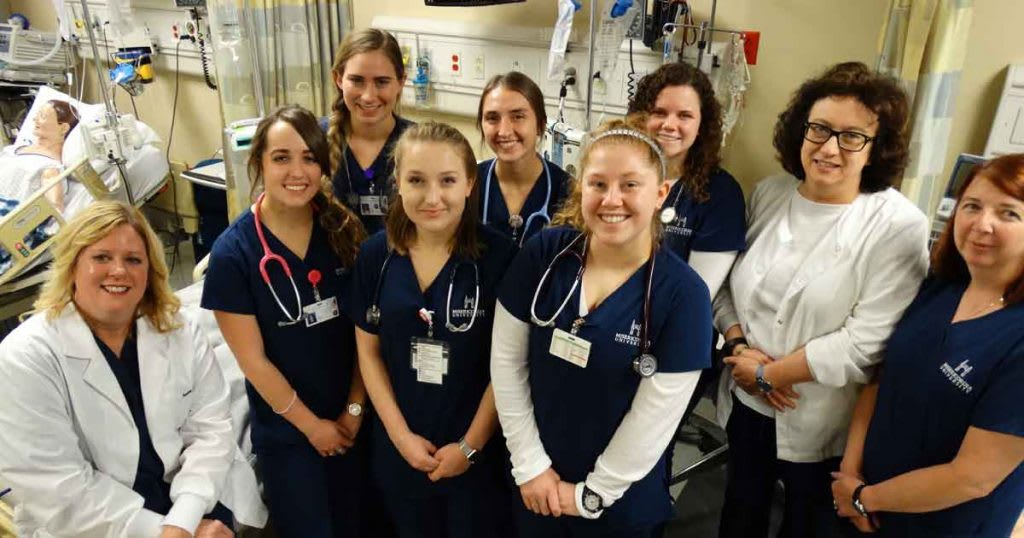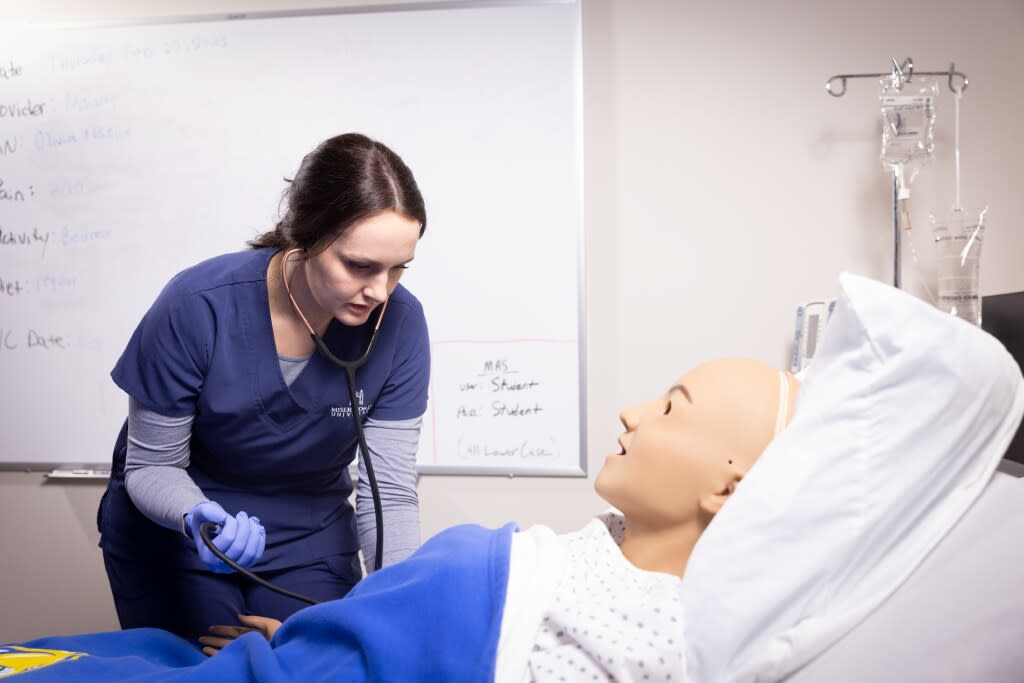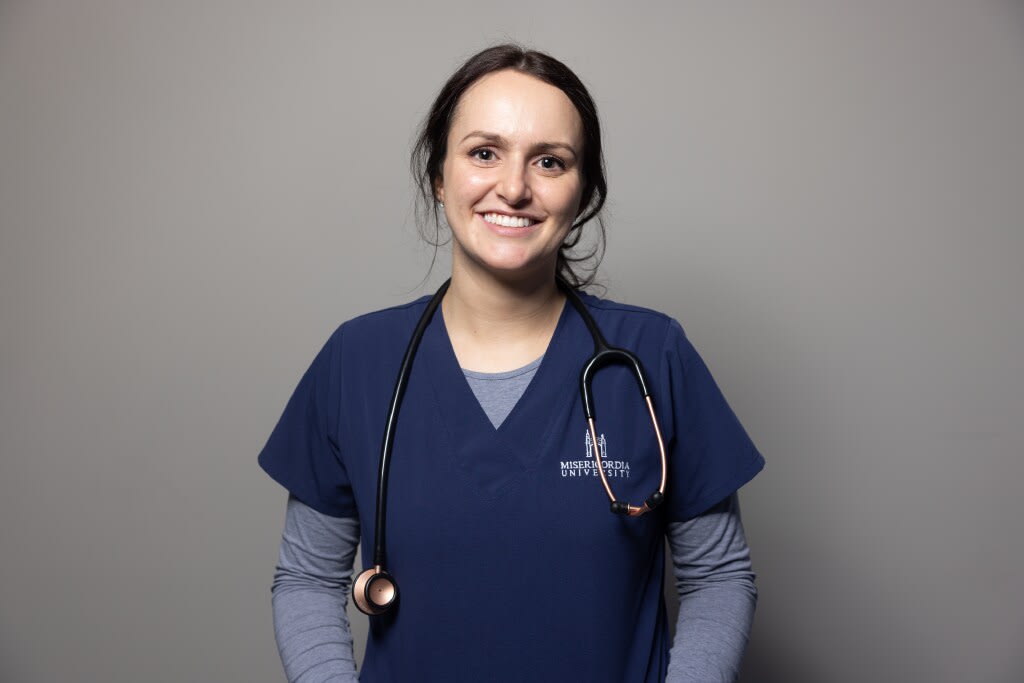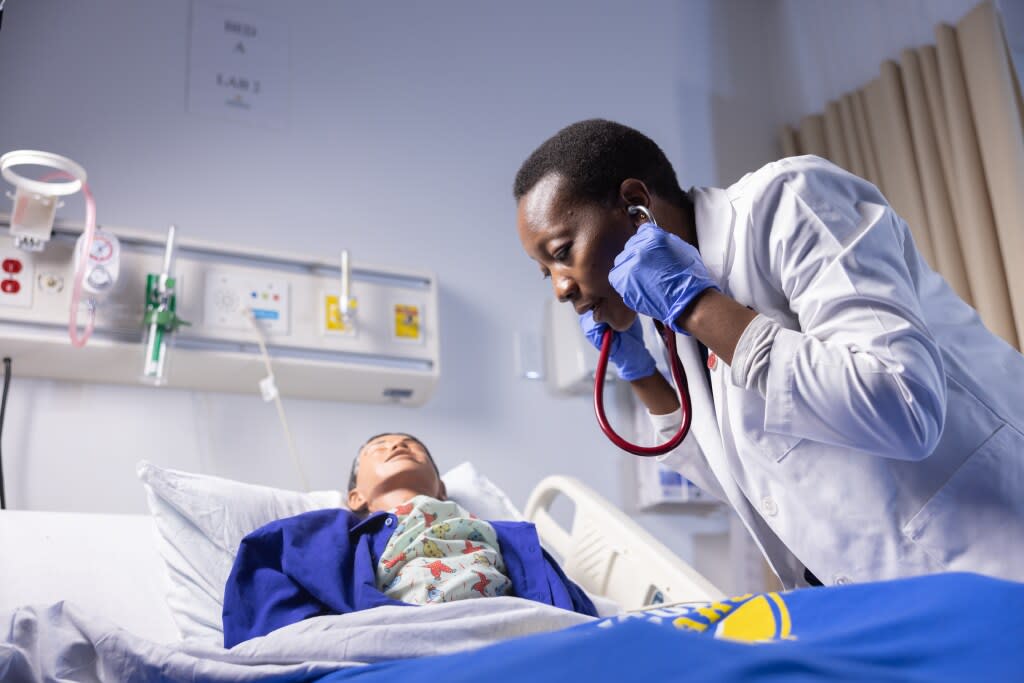Misericordia University Nursing Program Reviews
Each blog post is dated and contains accurate information as of that date. Certain information may have changed since the blog post publication date. If you would like to confirm the current accuracy of blog information, please visit our ABSN overview page or contact admissions at (866) 885-6337.

If you’re considering taking on an Accelerated Bachelor of Science in Nursing (ABSN) program, you might be wondering what real students have to say about how to succeed in nursing school. There is a wide range of nursing school advice out there, but it might not be relevant to your life experience and may not be helpful when considering the Misericordia ABSN program.
Misericordia University ranks in the top 10% of nursing programs in the country, and students have taken on our 16-month program and emerged with a degree ready to pursue their dream career as a nurse. To give you the information you’ll need to make an informed decision, we’ve compiled Misericordia University nursing program reviews from real ABSN graduates who spoke on their time in the program. In this post, they share their experiences on each aspect of our ABSN program and how we were able to help prepare them for exciting new careers.
Misericordia ABSN Students Share Their Experiences
Misericordia ABSN students can come from all walks of life, but they’re unified in their passion for helping others through delivering kind, compassionate care. Many don’t initially plan to become nurses, but the profession affects nearly everyone at one time or another. That contact can spark inspiration to follow a new career.
Below, three students share their experiences, what it takes to be a successful nursing student, and general nursing school advice they’ve discovered along the way. As you’ll see, no matter your perspective, there is a place for you in nursing.
Dominique Connected With Her Admissions Advisor
Dominique C. has had a passion for helping others for as long as she can remember. When she began her college education, she knew she’d end up in a health care career. Her first degree was a B.S. in Biology with a concentration in Pre-Physician Assistant, but to enter a career she needed more health care experience. She began working as an emergency room technician, but her coworkers commented that she had a “nursing mentality” and convinced her to try assisting nurses for a short time.
“I ended up loving it, and just the feedback I got from patients, my coworkers and managers really solidified that I actually do have a place,” she recalls. “I felt like, wow, this is where I was supposed to be this whole time.”
Dominique applied to several different ABSN programs before making her choice.
Megan Always Wanted to Live in Pittsburgh
Megan M. always wanted to work in health care, but wasn’t sure which role would suit her. She achieved an undergraduate degree in Health Sciences, knowing that it would help her down the line. “I think I personally always knew I was going to go into health care, I just didn't know the avenue I was going to take,” she said. “And [a Health Sciences] major allowed me to complete the prerequisites I needed for when I graduated going back to school for PA school, or an accelerated nursing program or PT school. So it kind of gave me a variety of options to find my own path.”
When considering what made her decide that she had a passion for nursing and led her to Misericordia, she shares “There were a lot of people in my life at the time going through nursing school. My roommates and close friends at the university I attended are in the nursing program, and my brother-in-law was going through an accelerated nursing program while my sister was in PA school. So being surrounded by that really inspired me. I'm hearing their own stories and their own personal journeys through nursing school. And I feel like I've always had a passion for helping other people during a time of need. So that's how I came to find my passion for nursing.”
On moving to Pittsburgh to take part in our ABSN program, she reflects:
Misericordia Was The Best Fit for Tracie
Tracie R. had broken into a different industry for years, and had found stability with a family before making the choice to change careers and go back to school for nursing. “So originally I graduated from Michigan State with a degree in accounting, and I went and worked for large chemical corporations for like 15 years working in different financials, but it was never what I really wanted to do,” she says. “I thought about going back to nursing several times but then started a family, and didn't really get a chance to go back.”
But personal events can create a new perspective, and this was especially true for Tracie. “What ultimately drove me to change was the loss of several relatives in a very short period of time, and the dissatisfaction with their care. And what I would do for someone if they were in that situation. So that's really what finally drove me just to go back and start.”
On why Misericordia was the right fit for her, she related “It fit the best, and I looked at their history and their main campus, and that saw that they had a solid background.” Tracie was also impressed by the amenities offered through our ABSN program campus.
For every type of student, they were each able to find their motivation that led them to Misericordia University. They were each driven to achieve their Bachelor of Science in Nursing Degree and put themselves on the best possible footing for a future career.
Nursing School Advice: Tips for Working Through the ABSN Program
Misericordia’s 16-month ABSN program combines online learning with in-person experience gained through labs and clinical rotations with regional leading health care providers. Coursework is online-based, with proctored exams administered onsite. Skills and simulation labs allow Misericordia ABSN students to practice and perfect nursing techniques in a mock clinical setting that they’ll apply to patients during clinical rotations and later during their careers. Clinical rotations allow you to gain nursing experience at top health care facilities and clinical agencies, working with experienced nurses. Lastly, after graduation you’ll need to pass the NCLEX-RN exam to become a practicing nurse.
Our program is intensive, and while we support you at every step along the way, you’ll need commitment and determination to see it through. As you’ll see from Misericordia ABSN students quoted below, during every step of the way, each was able to find the support they needed from instructors, advisors, mentors and fellow students within their cohorts.
Communicate with Instructors and Classmates
“Online learning is something I never did before, so it was a learning curve for me,” says Misericordia ABSN alumna Dominique C. “I'm a hands-on person, so first semester I struggled a bit.”
However, she says communicating with professors and working with her cohort was especially helpful. “Some students may be visual learners, some might be this type of learner and if we all kind of came together, we could just talk it all out. I felt like my tests improved. I felt like I understood the material better than me just sitting there reading a textbook.”
Shift Your Mindset — and Your Study Schedule
For Misericordia ABSN alumna Megan M., what started as an overwhelming challenge quickly became achievable with help from professors and a shift in mindset. “It definitely was a little overwhelming at first. But once I got the hang of things, I really enjoyed that I was able to study and learn the material on my own time and make my schedule my own. The good thing about online is that you have the freedom to do it whenever, but you have to figure out how to do it yourself. But you’re not going through it alone.”
A second-degree student and mother of four, Tracie R. had to deal with quite a transition from the last time she was taking courses. But she was able to find her groove and adjust to the needs of the program.
She says she also found the freedom of online learning especially helped with also meeting the needs of her children. “As far as studying goes, the nice thing was that it could be at any time. If it had to be late night, it would be late night and there wasn’t an actual class that would make me do it at a certain time.”
Work Together with Classmates and Know When to Ask for Help
Dominique found that keeping a level head and working with others, just like she’ll be doing in her career, was something that labs helped her practice.
“It’s putting you in that high stress environment and having to work together as a team, because you are with a partner in there. You have to learn how to control your emotions, but also work with somebody else and then understand it’s OK to ask for help. For example, we had the option to ask for a charge nurse if something wasn’t working or if we didn’t know what to do. That’s how it is in the real world. You know you’re not always alone. You’re able to ask for help.”

Focus on Perfecting Fundamental Skills
Megan was reassured by the learning environment she encountered before applying key nursing skills to patients in a clinical setting. As she shares, “You go in, you get your patient assignment and you get their report. Then you go in and assess your patient and you really don’t know what’s going to happen. But that’s the exciting part about it, because you get to be a nurse. It’s really a great learning experience. You can learn from yourself and from your classmates and provide constructive criticism to everyone. It's just a great learning environment."
Tracie appreciated the focus on fundamentals before moving into a clinical setting as well, saying, “First semester was a lot of fundamentals. For example, how do you make a bed? How do you make it by yourself or with the patient in the bed? How do you do bedpans? How do you set IV medications to go off on schedule? How do you flush lines?”
Speak Up and Take Initiative
As Dominique says, “I was quieter in the beginning because I was just trying to perfect everything and make sure I got that blood pressure right. I knew my nurse was going to come in and check it… As far as my last semester, I was really hands-on and I would just take the initiative and do things.”
“The first day of clinicals I was definitely very nervous because I never worked in a hospital or had a lot of patient interaction,” Megan says. “I was also very excited though. For that first day being in hospital, I’m looking back, I can see my growth and progress throughout the program. And there are a lot of times I doubted myself, but I think through my passion and perseverance, it outshone the doubt that I had.”
Get Comfortable Interacting with Patients
On overcoming challenges, Megan saw the progress she was able to make in getting comfortable. “What was most challenging for me was getting comfortable. I can see my progress from my very first day, when I was super nervous to even walk into patient’s room. Now, I feel comfortable going into a patient's room, sitting and talking with them and doing prep using those skills that I learned in skills lab.”
Begin to Think — and Work — Like a Nurse
Tracie enjoyed the buildup during her time in clinicals from being new to feeling confident taking charge of nursing duties. “We would be assigned a patient and were given a clinical packet that we had to fill out, like what medications patients are on? What problems do they have? How do you care for your patient? What would you do going forward with your patient?”

Asked what her favorite part of clinicals was, she answered: “The last two weeks, doing everything that your nurse would do. Of course, always saying you’re a student, but just having the confidence to go in and do everything that’s supposed to happen for your patient and not second guess yourself. With each week you get more confidence.”
Lean into What You Learn Throughout the Program
According to Dominique, “They talk about the NCLEX from day one. You talk about it through your whole entire program. And I will be honest that I was very nervous that am I able to learn in 16 months everything that I need to know for this NCLEX?” However, when practicing NCLEX exam questions, she realized “I remember my professor talking about this or I remember reading about this. That was my biggest fear of not being able to know all the content because it was such a fast-paced program. But in the end… it really proves that they did prepare us.”
Participate in the Post-Graduation Kaplan Course
Megan shares “Everything that nursing school provides you prepares you for the NCLEX. After we graduated, we were enrolled in a three-day Kaplan course, which was very helpful. They taught you how to walk through questions and use the decision tree, which is what Kaplan uses.” On test prep questions, “Having to do those really helped me determine where I needed to focus my studies before sitting for the NCLEX.”
Take Lots of Practice Exams
According to Tracie’s experience:
How to Succeed in Nursing School with Support Offered Through Misericordia ABSN
Any Misericordia university nursing program review also needs to include working with instructors and cohorts. With such a short program length, being able to work with and depend on those around you is a key to succeeding in nursing school and in your career. Luckily, our students can count on the support they’ll need to graduate and enter the field as confident practicing nurses.
Reach Out to Instructors for Help
Dominique says her professors made the difference in her time spent in the program.
“I personally had more contact with my professors than I’ve ever had in my previous degree, she says. “I could call them on my cell phone. I can email them and they’re emailing me back within two hours answering my question or setting up a Zoom meeting to go over content.”
Additionally, with manageable cohort sizes, there’s time for the student/instructor bond to grow stronger and build up trust. As Dominique shares, “I built such a great relationship with all my professors through my entire 16 months. I never ever had a connection like that in my previous four-year degree.”

Lean into Your Student Cohort for Support
Instructors helped Megan throughout her time in the program, but for her, her cohort was the standout element. As she reflects, “Throughout those 16 months, everyone in my cohort was super supportive and super motivating to one another. At the end of the day, we were all there to achieve the same goal to become a nurse. Everyone was more than willing to help everyone through the process, whether it was through our courses or through clinical.”
On the strong bonds she was able to form with her classmates, she shares: “I got to know every one of them very well. I’m appreciative that I met them. It's also nice to have the cohort to go through this with because a lot of times, it’s hard to relate to other people during this time, because you're so busy, and you have not a ton of free time.”
Tracie felt supported on all accounts during her time as a Misericordia ABSN student, saying:
What Is Needed to Be a Successful Nursing Student?
When asked what nursing advice they would give to prospective nursing students considering Misericordia ABSN, Dominique, Megan and Tracie all reflected on different aspects of their time and experience in the program.
Perseverance
Dominique says students will have to be prepared to work hard in order to get through the program. “I felt like for my undergrad, I didn't really work hard for it. I just I went through the motions, I'll be honest. But with nursing school, I had to try so hard. The exams are very difficult.” But after graduating, she feels immensely relieved and proud to pursue a career in nursing. “I've never been more proud of myself,” she reflects.
Empathy and Compassion
Megan experienced the challenge, but also wanted to emphasize the reward that comes from the program. “I think a lot of times people emphasize how hard it is, which is true. But I feel like it's not mentioned enough how good it feels to become a nurse, and how much you enjoyed the journey along the way.”
As her parting words, she spoke on the need for empathy as a nurse.
A Drive to Learn
For Tracie, taking advantage of every opportunity and asking questions was the takeaway she felt students should keep in mind. “Definitely ask a lot of questions. Don't assume that you think you might know. Ask because there's always somebody who can help. If it's not a teacher, it's another student. If it's not that maybe it’s your clinical instructor or the nurse you're assigned to that day in clinical. Use the support that’s offered because almost everybody makes themselves very accessible.”
Begin Your Nursing Journey
Now that you’ve heard Misericordia University nursing program reviews from real ABSN students, we hope you’ve heard the stories and experiences to make you feel comfortable in applying to the Misericordia ABSN program and beginning your own nursing journey. Contact us to begin a conversation, and take the next step toward becoming a nurse today.
